语法专题 宾语从句复习课件
图片预览
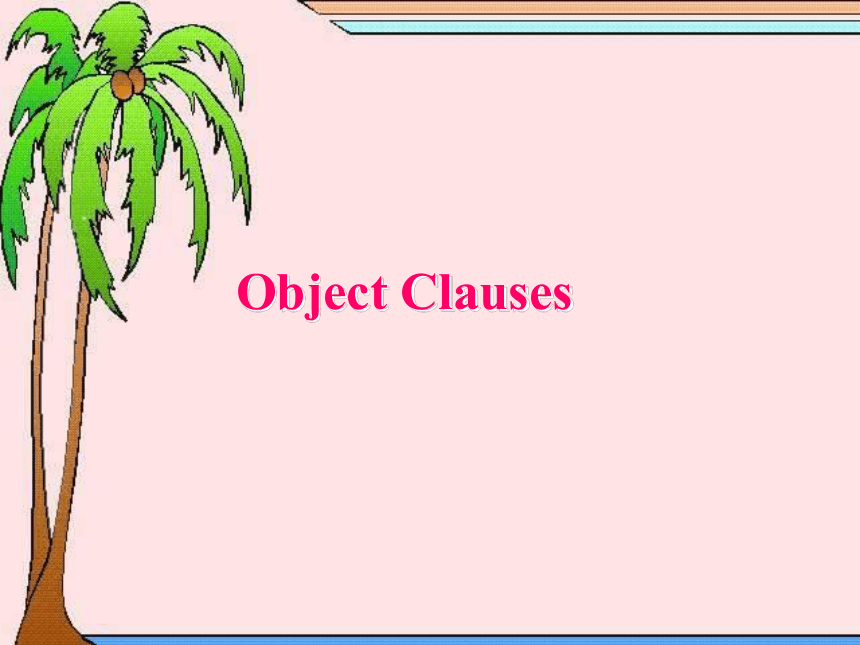
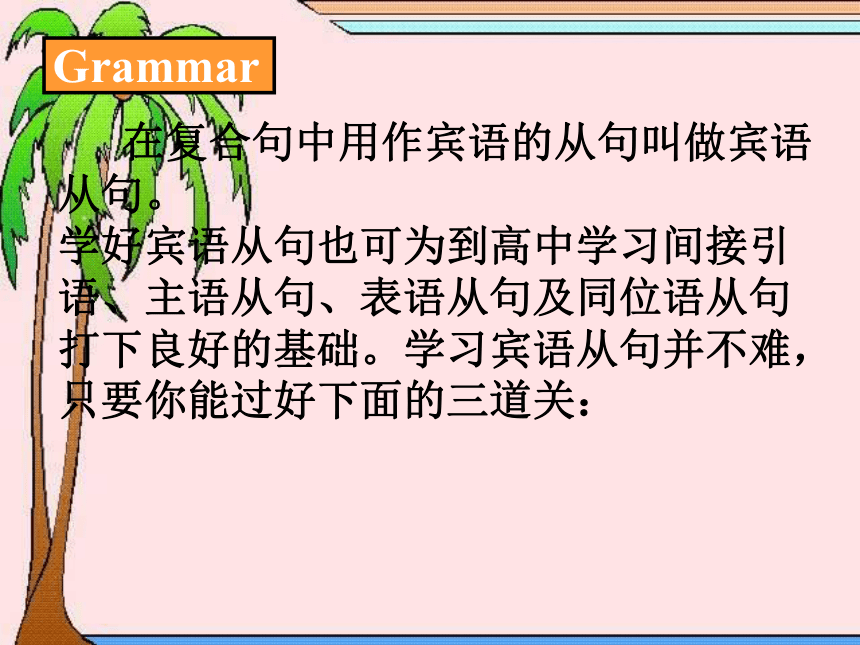

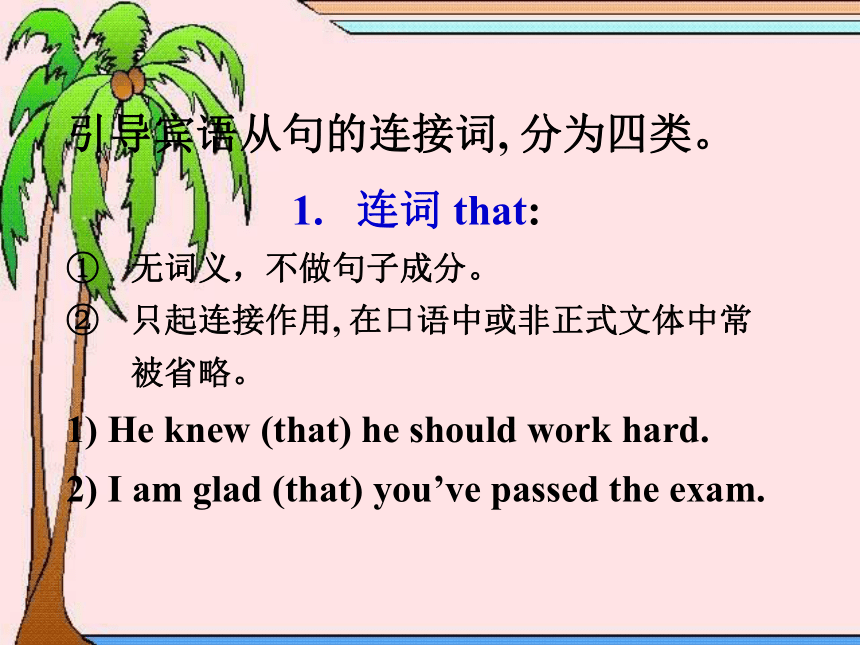
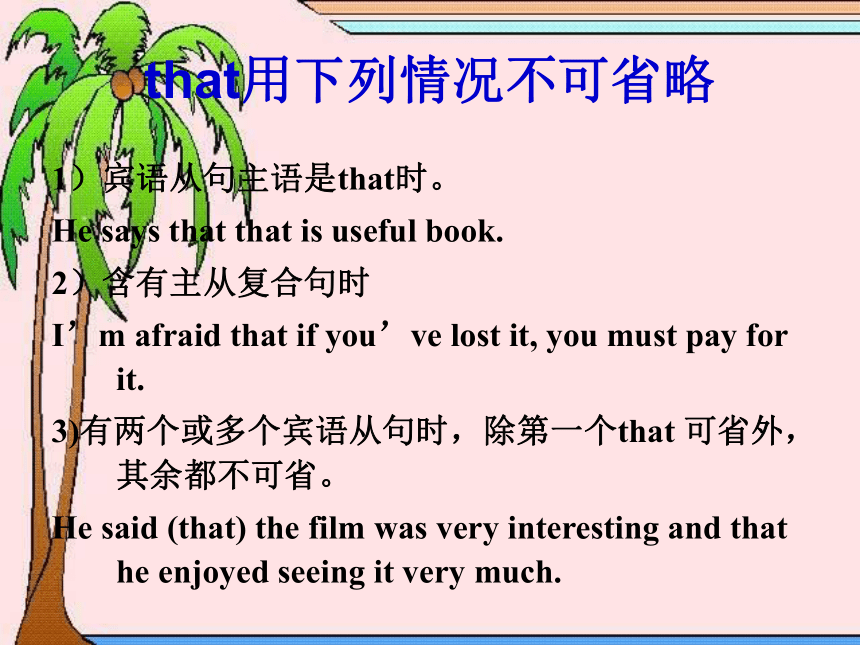
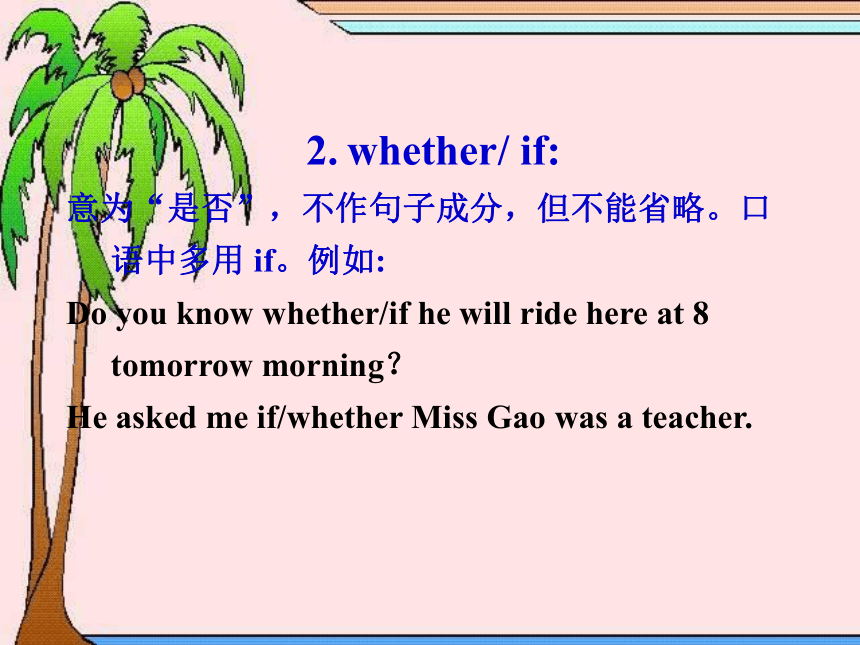
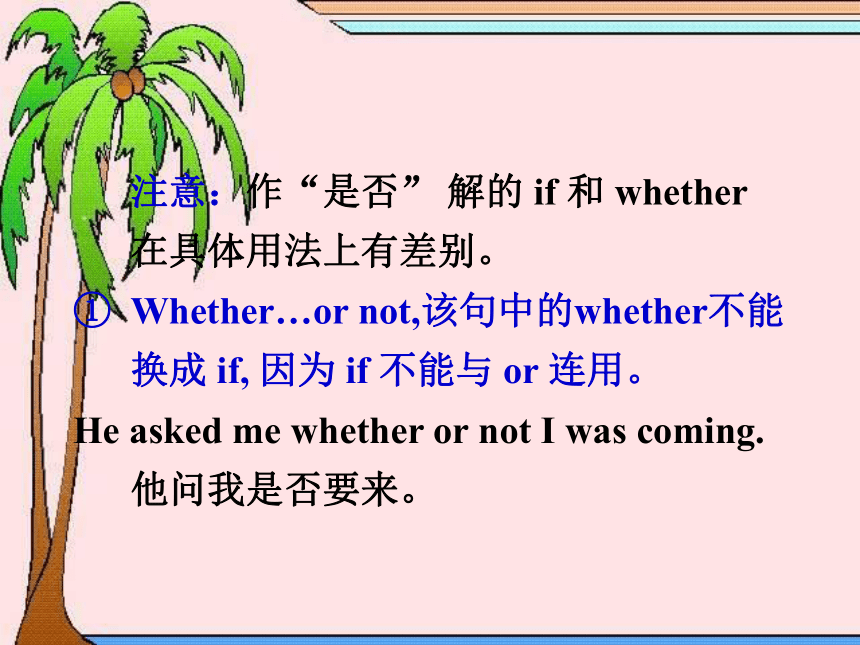
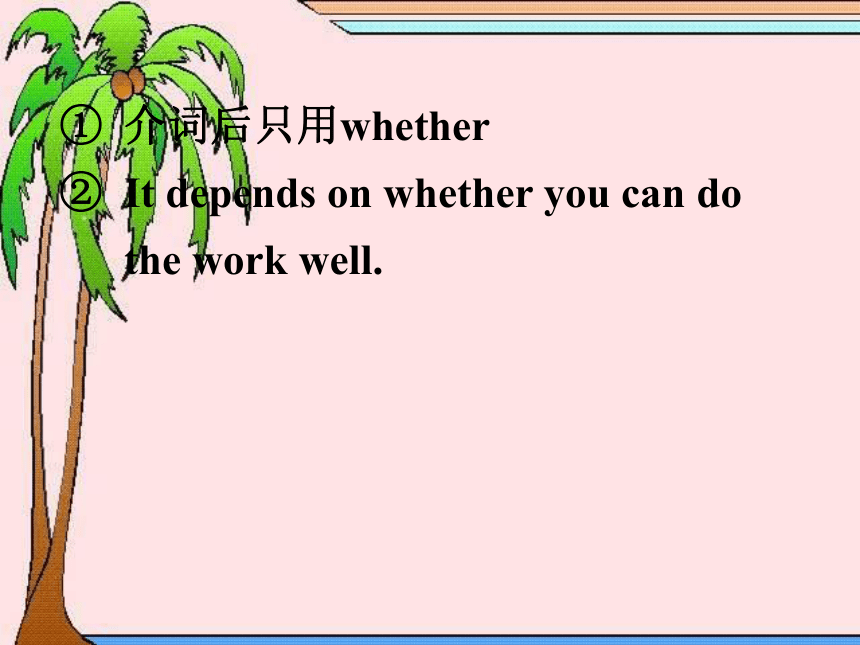

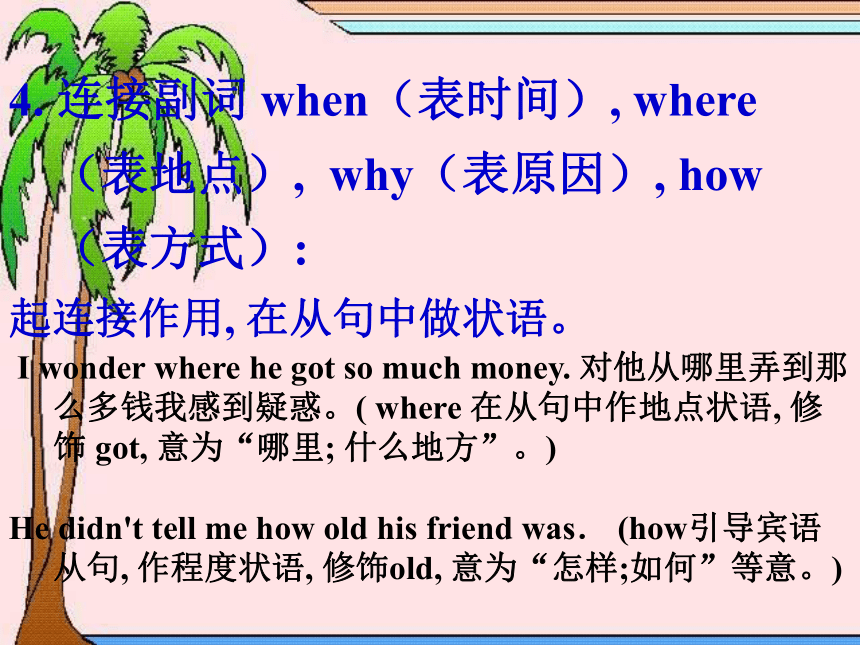
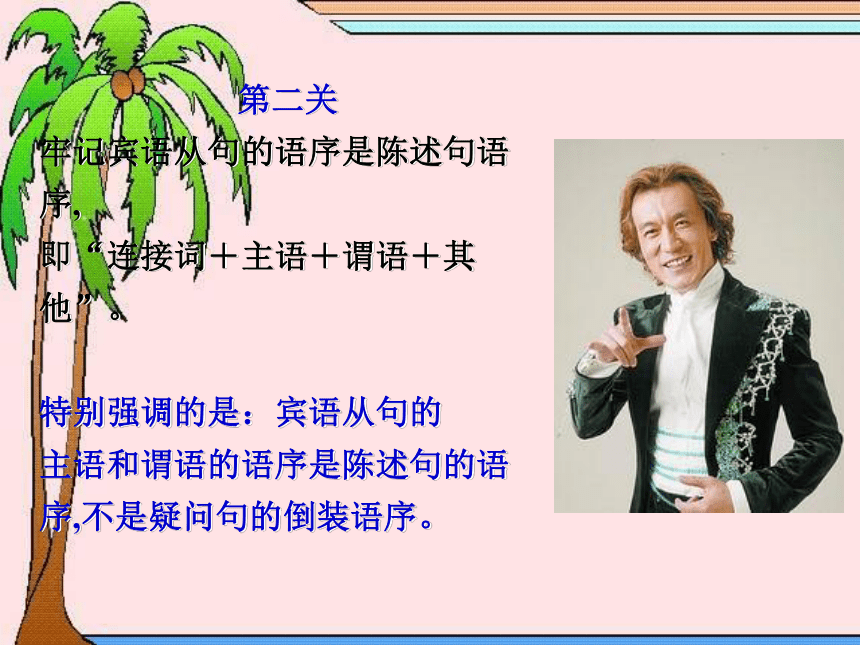
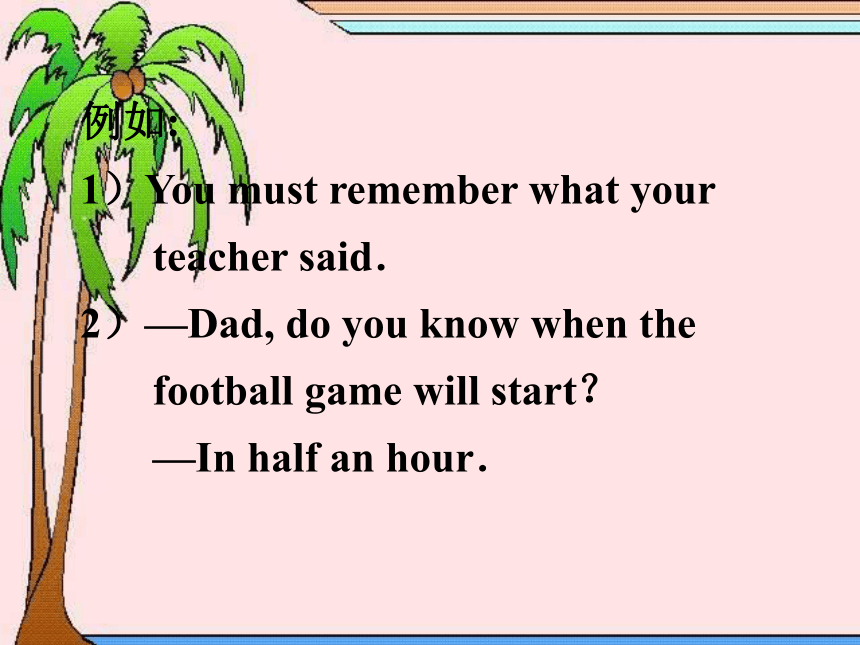
文档简介
(共30张PPT)
Object
Clauses
Grammar
在复合句中用作宾语的从句叫做宾语从句。
学好宾语从句也可为到高中学习间接引语、主语从句、表语从句及同位语从句打下良好的基础。学习宾语从句并不难,只要你能过好下面的三道关:
第一关
选好连接词
(也叫关联词)
:指引导宾语从句的词
连词
that:
无词义,不做句子成分。
只起连接作用,
在口语中或非正式文体中常被省略。
1)
He
knew
(that)
he
should
work
hard.
2)
I
am
glad
(that)
you’ve
passed
the
exam.
引导宾语从句的连接词,
分为四类。
that用下列情况不可省略
1)宾语从句主语是that时。
He
says
that
that
is
useful
book.
2)含有主从复合句时
I’m
afraid
that
if
you’ve
lost
it,
you
must
pay
for
it.
3)有两个或多个宾语从句时,除第一个that
可省外,其余都不可省。
He
said
(that)
the
film
was
very
interesting
and
that
he
enjoyed
seeing
it
very
much.
2.
whether/
if:
意为“是否”,不作句子成分,但不能省略。口语中多用
if。例如:
Do
you
know
whether/if
he
will
ride
here
at
8
tomorrow
morning?
He
asked
me
if/whether
Miss
Gao
was
a
teacher.
注意:作“是否”
解的
if
和
whether
在具体用法上有差别。
Whether…or
not,该句中的whether不能换成
if,
因为
if
不能与
or
连用。
He
asked
me
whether
or
not
I
was
coming.
他问我是否要来。
介词后只用whether
It
depends
on
whether
you
can
do
the
work
well.
3.
who,
whom,
whose,
what,
which等连接代词
:
它们起连接作用,
作句子成分,
如主语、宾语、定语等。
各有其自己的意义。
The
teacher
asked
the
new
student
which
class
he
was
in?
(which引导宾语从句,
在从句中作定语,
修饰
class,
意为“哪个”。)
Can
you
tell
me
whom
he
is
waiting
for?
4.
连接副词
when(表时间),
where(表地点),
why(表原因),
how(表方式):
起连接作用,
在从句中做状语。
I
wonder
where
he
got
so
much
money.
对他从哪里弄到那么多钱我感到疑惑。(
where
在从句中作地点状语,
修饰
got,
意为“哪里;
什么地方”。)
He
didn't
tell
me
how
old
his
friend
was.
(how引导宾语从句,
作程度状语,
修饰old,
意为“怎样;如何”等意。)
第二关
牢记宾语从句的语序是陈述句语序,
即“连接词+主语+谓语+其他”。
特别强调的是:宾语从句的
主语和谓语的语序是陈述句的语序,不是疑问句的倒装语序。
例如:
1)You
must
remember
what
your
teacher
said.
2)—Dad,
do
you
know
when
the
football
game
will
start?
—In
half
an
hour.
3)
汉译英:
你能不能告诉我,
我们去看望谁?
误:
Can
you
tell
me
who
(m)
do
we
have
to
see?
正:
Can
you
tell
me
who
(m)
we
have
to
see?
易出的错在宾语从句中误用了疑问句的结构—主语前加了个助动词do。因为我们已经习惯了特殊疑问句,
如:
What
time
does
the
plane
arrive
in
Paris?
就顺口说出“Do
you
know
what
time
does
the
plane
arrive
in
Paris?”
这种错误句子来。
但是一旦我们注意了,
我们不久就习惯于说“Do
you
know
what
time
the
plane
arrives
in
Paris?”了。
第三关
注意时态的呼应。
13)
汉译英:我原以为你今天有空的。
误:
I
thought
(that)
you
are
free
today.
正:
I
thought
(that)
you
would
be
free
today.
宾语从句中谓语动词的时态,
常常受主句谓语时态的制约,
这种现象称为“时态的呼应”。例如:
错句中宾语从句用
are
很可能是因为有
today,
但因为主句谓语是thought,
所以从句谓语就该用过去将来时
would
be
了。
1.
如果主句谓语是现在的某种时态(包括一般现在时,现在进行时,现在完成时),
那么宾语从句的时态可根据实际情况而定。
I
remember
he
gave
me
a
book
yesterday.
He
has
told
me
that
he’ll
leave
for
New
York
tomorrow.
2.
如果主句时态是过去时,
宾语从句一般要随着改为相应的过去时(即一般过去时、过去进行时、过去完成时、过去将来时等)。例如:
(1)He
thought
he
was
working
for
the
people.
2)
I
heard
she
had
been
to
the
Great
Wall.
3)
John
hoped
that
he
would
find
a
job
soon.
3.
但宾语从句如果表示定理法则、永恒真理等,
则不变化(即使主句是过去时,从句也用一般现在时):
4)
The
teacher
told
us
that
the
earth
moves
around
the
sun.
否定转移
在think,
believe,
suppose,
seem引导的宾语从句,否定不用再从句中,要否定转移。
I
don’t
think
he
will
come
with
you.
It
doesn’t
seem
that
he
can
do
it
better.
宾语从句简化
宾语从句与主句的主语相同,主句谓语动词是hope,
wish,
decide,
agree,
choose等时,从句可简化成不定式结构。
I
hope
that
I
can
receive
your
e-mail.=
I
hope
to
receive
your
e-mail.
2.
当宾语从句与主句主语相同,主句谓语是know,
remember,
forget,
learn时,简化“疑问词+不定式”
She
doesn’t
know
what
she
would
do
next.
=
She
doesn’t
know
what
to
do
next.
3.
Seem
后宾语从句的简化(seem有时态变化)
It
seems
that
football
is
very
interesting.
=Football
seems
to
be
very
interesting.
4.
宾语从句可简化成n.或n.短语
I
don’t
believe
what
Tom
said.
=
I
don’t
believe
Tom’s
words.
1.
In
the
bookshop,
a
reader
asked
the
shopkeeper
___
Who
Moved
My
Cheese
was
an
interesting
book.
A.
that
B.
how
C.
what
D.
if
2.
—I
don't
know
___
Mr.
Green
will
come
to
see
us.
—He
will
help
us
with
our
English.
A.
why
B.
when
C.
how
D.
where
巩固与检测
D
A
3.
–We
never
know
__
the
old
man
is.
–
They
say
he
is
a
teacher.
A.
what
B.
who
C.
which
D.
where
4.
I
was
told
___
Bill
Gates
was
thirteen
he
began
to
play
with
computers.
A.
that
how
B.
how
that
C.
when
that
D.
that
when
D
A
5.
—Do
you
know
___?
I'm
going
to
see
him.
—Sorry,
I
don't
know.
A.
where
does
Mr.
Li
live
B.
where
did
Mr.
Li
live
C.
where
Mr.
Li
lives
D.
where
Mr.
Li
lived
C
6.
—Where
do
you
think
__
he
__
the
computer?
—Sorry,
I
have
no
idea.
A./;
bought
B.
has;
bought
C.
did;
buy
D.
does;
buy
A
7.
I
don’t
feel
very
well.
Mum
asked
me
_____
this
morning.
A.
what
the
matter
is
B.
what
is
wrong
C.
what
the
matter
was
D.
what
wrong
was
C
8.
—Where
is
Jack?
—He
is
away
to
spend
his
holiday.
He's
gone
either
to
Hangzhou
or
to
Wuhan,
but
I'm
not
sure
_____.
A.
that
B.
which
C.
where
D.
there
C
Object
Clauses
Grammar
在复合句中用作宾语的从句叫做宾语从句。
学好宾语从句也可为到高中学习间接引语、主语从句、表语从句及同位语从句打下良好的基础。学习宾语从句并不难,只要你能过好下面的三道关:
第一关
选好连接词
(也叫关联词)
:指引导宾语从句的词
连词
that:
无词义,不做句子成分。
只起连接作用,
在口语中或非正式文体中常被省略。
1)
He
knew
(that)
he
should
work
hard.
2)
I
am
glad
(that)
you’ve
passed
the
exam.
引导宾语从句的连接词,
分为四类。
that用下列情况不可省略
1)宾语从句主语是that时。
He
says
that
that
is
useful
book.
2)含有主从复合句时
I’m
afraid
that
if
you’ve
lost
it,
you
must
pay
for
it.
3)有两个或多个宾语从句时,除第一个that
可省外,其余都不可省。
He
said
(that)
the
film
was
very
interesting
and
that
he
enjoyed
seeing
it
very
much.
2.
whether/
if:
意为“是否”,不作句子成分,但不能省略。口语中多用
if。例如:
Do
you
know
whether/if
he
will
ride
here
at
8
tomorrow
morning?
He
asked
me
if/whether
Miss
Gao
was
a
teacher.
注意:作“是否”
解的
if
和
whether
在具体用法上有差别。
Whether…or
not,该句中的whether不能换成
if,
因为
if
不能与
or
连用。
He
asked
me
whether
or
not
I
was
coming.
他问我是否要来。
介词后只用whether
It
depends
on
whether
you
can
do
the
work
well.
3.
who,
whom,
whose,
what,
which等连接代词
:
它们起连接作用,
作句子成分,
如主语、宾语、定语等。
各有其自己的意义。
The
teacher
asked
the
new
student
which
class
he
was
in?
(which引导宾语从句,
在从句中作定语,
修饰
class,
意为“哪个”。)
Can
you
tell
me
whom
he
is
waiting
for?
4.
连接副词
when(表时间),
where(表地点),
why(表原因),
how(表方式):
起连接作用,
在从句中做状语。
I
wonder
where
he
got
so
much
money.
对他从哪里弄到那么多钱我感到疑惑。(
where
在从句中作地点状语,
修饰
got,
意为“哪里;
什么地方”。)
He
didn't
tell
me
how
old
his
friend
was.
(how引导宾语从句,
作程度状语,
修饰old,
意为“怎样;如何”等意。)
第二关
牢记宾语从句的语序是陈述句语序,
即“连接词+主语+谓语+其他”。
特别强调的是:宾语从句的
主语和谓语的语序是陈述句的语序,不是疑问句的倒装语序。
例如:
1)You
must
remember
what
your
teacher
said.
2)—Dad,
do
you
know
when
the
football
game
will
start?
—In
half
an
hour.
3)
汉译英:
你能不能告诉我,
我们去看望谁?
误:
Can
you
tell
me
who
(m)
do
we
have
to
see?
正:
Can
you
tell
me
who
(m)
we
have
to
see?
易出的错在宾语从句中误用了疑问句的结构—主语前加了个助动词do。因为我们已经习惯了特殊疑问句,
如:
What
time
does
the
plane
arrive
in
Paris?
就顺口说出“Do
you
know
what
time
does
the
plane
arrive
in
Paris?”
这种错误句子来。
但是一旦我们注意了,
我们不久就习惯于说“Do
you
know
what
time
the
plane
arrives
in
Paris?”了。
第三关
注意时态的呼应。
13)
汉译英:我原以为你今天有空的。
误:
I
thought
(that)
you
are
free
today.
正:
I
thought
(that)
you
would
be
free
today.
宾语从句中谓语动词的时态,
常常受主句谓语时态的制约,
这种现象称为“时态的呼应”。例如:
错句中宾语从句用
are
很可能是因为有
today,
但因为主句谓语是thought,
所以从句谓语就该用过去将来时
would
be
了。
1.
如果主句谓语是现在的某种时态(包括一般现在时,现在进行时,现在完成时),
那么宾语从句的时态可根据实际情况而定。
I
remember
he
gave
me
a
book
yesterday.
He
has
told
me
that
he’ll
leave
for
New
York
tomorrow.
2.
如果主句时态是过去时,
宾语从句一般要随着改为相应的过去时(即一般过去时、过去进行时、过去完成时、过去将来时等)。例如:
(1)He
thought
he
was
working
for
the
people.
2)
I
heard
she
had
been
to
the
Great
Wall.
3)
John
hoped
that
he
would
find
a
job
soon.
3.
但宾语从句如果表示定理法则、永恒真理等,
则不变化(即使主句是过去时,从句也用一般现在时):
4)
The
teacher
told
us
that
the
earth
moves
around
the
sun.
否定转移
在think,
believe,
suppose,
seem引导的宾语从句,否定不用再从句中,要否定转移。
I
don’t
think
he
will
come
with
you.
It
doesn’t
seem
that
he
can
do
it
better.
宾语从句简化
宾语从句与主句的主语相同,主句谓语动词是hope,
wish,
decide,
agree,
choose等时,从句可简化成不定式结构。
I
hope
that
I
can
receive
your
e-mail.=
I
hope
to
receive
your
e-mail.
2.
当宾语从句与主句主语相同,主句谓语是know,
remember,
forget,
learn时,简化“疑问词+不定式”
She
doesn’t
know
what
she
would
do
next.
=
She
doesn’t
know
what
to
do
next.
3.
Seem
后宾语从句的简化(seem有时态变化)
It
seems
that
football
is
very
interesting.
=Football
seems
to
be
very
interesting.
4.
宾语从句可简化成n.或n.短语
I
don’t
believe
what
Tom
said.
=
I
don’t
believe
Tom’s
words.
1.
In
the
bookshop,
a
reader
asked
the
shopkeeper
___
Who
Moved
My
Cheese
was
an
interesting
book.
A.
that
B.
how
C.
what
D.
if
2.
—I
don't
know
___
Mr.
Green
will
come
to
see
us.
—He
will
help
us
with
our
English.
A.
why
B.
when
C.
how
D.
where
巩固与检测
D
A
3.
–We
never
know
__
the
old
man
is.
–
They
say
he
is
a
teacher.
A.
what
B.
who
C.
which
D.
where
4.
I
was
told
___
Bill
Gates
was
thirteen
he
began
to
play
with
computers.
A.
that
how
B.
how
that
C.
when
that
D.
that
when
D
A
5.
—Do
you
know
___?
I'm
going
to
see
him.
—Sorry,
I
don't
know.
A.
where
does
Mr.
Li
live
B.
where
did
Mr.
Li
live
C.
where
Mr.
Li
lives
D.
where
Mr.
Li
lived
C
6.
—Where
do
you
think
__
he
__
the
computer?
—Sorry,
I
have
no
idea.
A./;
bought
B.
has;
bought
C.
did;
buy
D.
does;
buy
A
7.
I
don’t
feel
very
well.
Mum
asked
me
_____
this
morning.
A.
what
the
matter
is
B.
what
is
wrong
C.
what
the
matter
was
D.
what
wrong
was
C
8.
—Where
is
Jack?
—He
is
away
to
spend
his
holiday.
He's
gone
either
to
Hangzhou
or
to
Wuhan,
but
I'm
not
sure
_____.
A.
that
B.
which
C.
where
D.
there
C
同课章节目录
- 词法
- 名词
- 动词和动词短语
- 动词语态
- 动词时态
- 助动词和情态动词
- 非谓语动词
- 冠词
- 代词
- 数词和量词
- 形容词副词及其比较等级
- 介词和介词短语
- 连词和感叹词
- 构词法
- 相似、相近词比较
- 句法
- 陈述句
- 一般疑问句和否定疑问句
- 特殊疑问句及选择疑问句
- 反意疑问句
- 存在句(There be句型)
- 宾语从句
- 定语从句
- 状语从句
- 主谓一致问题
- 简单句
- 并列句
- 复合句
- 主谓一致
- 主、表语从句
- 名词性从句
- 直接引语和间接引语
- 虚拟语气
- 感叹句
- 强调句
- 倒装句
- 祈使句
- 句子的成分
- 句子的分类
- 题型专区
- 单项选择部分
- 易错题
- 完形填空
- 阅读理解
- 词汇练习
- 听说训练
- 句型转换
- 补全对话
- 短文改错
- 翻译
- 书面表达
- 任务型阅读
- 语法填空
- 其他资料
